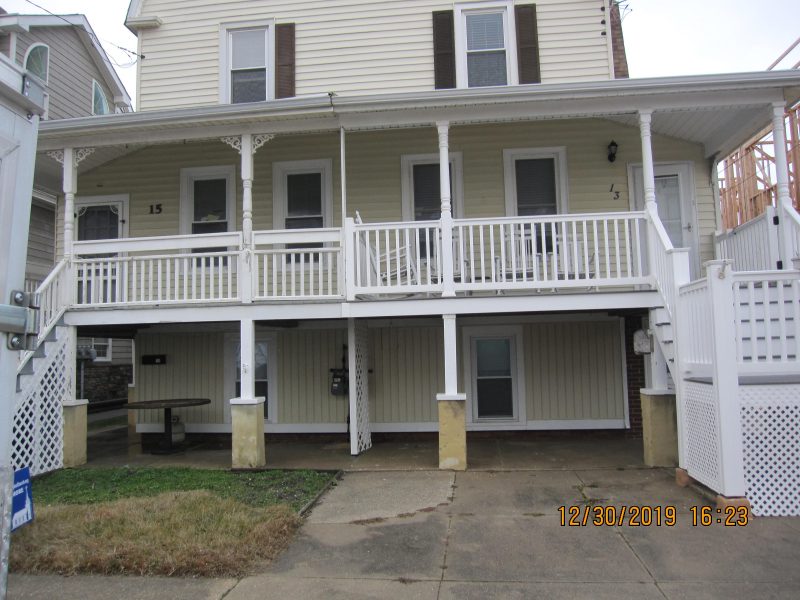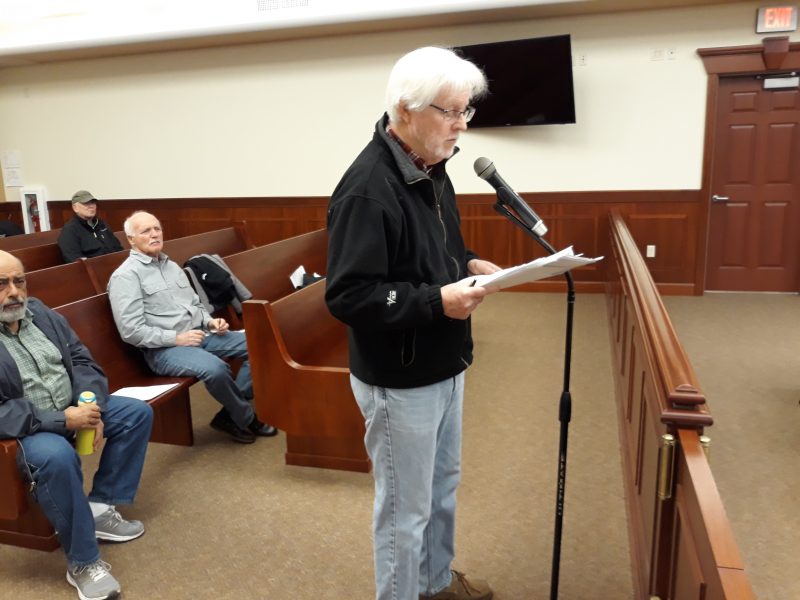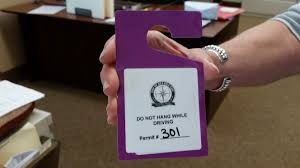Seasonal parking permits routinely sell out each year.
 By DONALD WITTKOWSKI
Some of the historic homes in Sea Isle City were built before Henry Ford revolutionized America’s transportation by introducing the Model T in 1908.
A closer look at those homes from the late 1800s and early 1900s reveals what is now a modern oddity: They lack a driveway. With no automobiles crowding the roads in the old days, what home needed a driveway back then?
Well, more than 100 years later, the irony is that there is nowhere for the present-day homeowners to park their cars, SUVs or trucks on their own property. One of them is Andrew Bednarek, whose family-owned home at 15 51st Street dates to around 1886.
Bednarek, however, is pitching a new plan for City Council to create special “parking zones” to accommodate three historic homes that were built on undersized lots and don’t have driveways.
His plan calls for using up to six existing parking spaces on the streets and reserving them for historic homeowners who can’t safely fit their cars on their own property. Those homeowners would buy up to two seasonal parking permits from the city for the right to use those spaces, according to his plan.
In all, three historic homes in the beach block east of Pleasure Avenue would fit the criteria, Bednarek said. They include the Bednarek family house at 15 51st Street and its attached “twin” home at 13 51st Street. The third home is at 4209 Pleasure Ave.
“According to municipal property records, the three identified residences were constructed pre-manufacture of the automobiles in the U.S. in 1900 and without the intent to provide on-site parking,” Bednarek told members of City Council while presenting his parking plan to them during their meeting Tuesday.
Bednarek said he identified those three homes by surveying all of the houses on the ocean side of Pleasure Avenue between 29th and 93rd streets.
By DONALD WITTKOWSKI
Some of the historic homes in Sea Isle City were built before Henry Ford revolutionized America’s transportation by introducing the Model T in 1908.
A closer look at those homes from the late 1800s and early 1900s reveals what is now a modern oddity: They lack a driveway. With no automobiles crowding the roads in the old days, what home needed a driveway back then?
Well, more than 100 years later, the irony is that there is nowhere for the present-day homeowners to park their cars, SUVs or trucks on their own property. One of them is Andrew Bednarek, whose family-owned home at 15 51st Street dates to around 1886.
Bednarek, however, is pitching a new plan for City Council to create special “parking zones” to accommodate three historic homes that were built on undersized lots and don’t have driveways.
His plan calls for using up to six existing parking spaces on the streets and reserving them for historic homeowners who can’t safely fit their cars on their own property. Those homeowners would buy up to two seasonal parking permits from the city for the right to use those spaces, according to his plan.
In all, three historic homes in the beach block east of Pleasure Avenue would fit the criteria, Bednarek said. They include the Bednarek family house at 15 51st Street and its attached “twin” home at 13 51st Street. The third home is at 4209 Pleasure Ave.
“According to municipal property records, the three identified residences were constructed pre-manufacture of the automobiles in the U.S. in 1900 and without the intent to provide on-site parking,” Bednarek told members of City Council while presenting his parking plan to them during their meeting Tuesday.
Bednarek said he identified those three homes by surveying all of the houses on the ocean side of Pleasure Avenue between 29th and 93rd streets.

Sea Isle resident Andrew Bednarek describes his parking plan during a City Council meeting.
In order to build on-site parking on the undersized lots of the three historic homes, the owners would have to obtain a zoning variance. The owner of 13 51st Street has an application with the zoning board for such a variance, Bednarek said.
Bednarek, though, said his parking proposal would help historic homeowners avoid the expense of hiring attorneys, architects and engineers to file zoning applications. There would be no need for those homeowners to build parking spots on their undersized lots if they could use designated paid parking spaces on the street, he explained.
He also said it is important to maintain the visual, aesthetic and architectural character of the historic homes – instead of altering them by adding new parking spaces on undersized lots.
“By keeping parking in the street, public safety concerns would also be satisfied, as pulling into and backing out of an undersized non-conforming parking space, especially in the beach block, could open the municipality to additional liability,” Bednarek wrote in his parking proposal.
He explained that court cases in New Jersey, and a case in Virginia that made it all the way to the U.S. Supreme Court, support the type of parking plan he has proposed. Other New Jersey municipalities, including Atlantic City, Princeton, Ridgefield and Edgewater, already have parking ordinances similar to his on-street parking plan, he added.
Some members of Sea Isle’s City Council seemed receptive to Bednarek’s proposal. They said it should be referred to Mayor Leonard Desiderio’s administration for further consideration.
“I think it’s a good idea,” Councilman Jack Gibson said.
Councilman Frank Edwardi suggested that Bednarek’s proposal should be considered as part of a broader “blanket” parking plan throughout Sea Isle.

Under Andrew Bednarek's plan, the owners of three historic homes would buy seasonal parking permits from the city to reserve existing spaces for them on the street.
City Solicitor Paul Baldini said the owners of other historic homes in Sea Isle have made similar requests for reserved, on-street parking spots. He noted that the issue is being studied as part of the city’s parking laws, but cautioned that there could be legal impediments.
“It’s more complicated than it sounds from one from one side of the coin,” Baldini said.
In an interview Friday, Bednarek said the city should use his parking plan as a test program to find out whether it could serve as a model for the rest of Sea Isle.
“Do a pilot program on my proposal to see how it works, to see the pluses and minuses and whether there are any unintended consequences,” he said.
 By DONALD WITTKOWSKI
Some of the historic homes in Sea Isle City were built before Henry Ford revolutionized America’s transportation by introducing the Model T in 1908.
A closer look at those homes from the late 1800s and early 1900s reveals what is now a modern oddity: They lack a driveway. With no automobiles crowding the roads in the old days, what home needed a driveway back then?
Well, more than 100 years later, the irony is that there is nowhere for the present-day homeowners to park their cars, SUVs or trucks on their own property. One of them is Andrew Bednarek, whose family-owned home at 15 51st Street dates to around 1886.
Bednarek, however, is pitching a new plan for City Council to create special “parking zones” to accommodate three historic homes that were built on undersized lots and don’t have driveways.
His plan calls for using up to six existing parking spaces on the streets and reserving them for historic homeowners who can’t safely fit their cars on their own property. Those homeowners would buy up to two seasonal parking permits from the city for the right to use those spaces, according to his plan.
In all, three historic homes in the beach block east of Pleasure Avenue would fit the criteria, Bednarek said. They include the Bednarek family house at 15 51st Street and its attached “twin” home at 13 51st Street. The third home is at 4209 Pleasure Ave.
“According to municipal property records, the three identified residences were constructed pre-manufacture of the automobiles in the U.S. in 1900 and without the intent to provide on-site parking,” Bednarek told members of City Council while presenting his parking plan to them during their meeting Tuesday.
Bednarek said he identified those three homes by surveying all of the houses on the ocean side of Pleasure Avenue between 29th and 93rd streets.
By DONALD WITTKOWSKI
Some of the historic homes in Sea Isle City were built before Henry Ford revolutionized America’s transportation by introducing the Model T in 1908.
A closer look at those homes from the late 1800s and early 1900s reveals what is now a modern oddity: They lack a driveway. With no automobiles crowding the roads in the old days, what home needed a driveway back then?
Well, more than 100 years later, the irony is that there is nowhere for the present-day homeowners to park their cars, SUVs or trucks on their own property. One of them is Andrew Bednarek, whose family-owned home at 15 51st Street dates to around 1886.
Bednarek, however, is pitching a new plan for City Council to create special “parking zones” to accommodate three historic homes that were built on undersized lots and don’t have driveways.
His plan calls for using up to six existing parking spaces on the streets and reserving them for historic homeowners who can’t safely fit their cars on their own property. Those homeowners would buy up to two seasonal parking permits from the city for the right to use those spaces, according to his plan.
In all, three historic homes in the beach block east of Pleasure Avenue would fit the criteria, Bednarek said. They include the Bednarek family house at 15 51st Street and its attached “twin” home at 13 51st Street. The third home is at 4209 Pleasure Ave.
“According to municipal property records, the three identified residences were constructed pre-manufacture of the automobiles in the U.S. in 1900 and without the intent to provide on-site parking,” Bednarek told members of City Council while presenting his parking plan to them during their meeting Tuesday.
Bednarek said he identified those three homes by surveying all of the houses on the ocean side of Pleasure Avenue between 29th and 93rd streets.
 Sea Isle resident Andrew Bednarek describes his parking plan during a City Council meeting.
In order to build on-site parking on the undersized lots of the three historic homes, the owners would have to obtain a zoning variance. The owner of 13 51st Street has an application with the zoning board for such a variance, Bednarek said.
Sea Isle resident Andrew Bednarek describes his parking plan during a City Council meeting.
In order to build on-site parking on the undersized lots of the three historic homes, the owners would have to obtain a zoning variance. The owner of 13 51st Street has an application with the zoning board for such a variance, Bednarek said. Under Andrew Bednarek's plan, the owners of three historic homes would buy seasonal parking permits from the city to reserve existing spaces for them on the street.
City Solicitor Paul Baldini said the owners of other historic homes in Sea Isle have made similar requests for reserved, on-street parking spots. He noted that the issue is being studied as part of the city’s parking laws, but cautioned that there could be legal impediments.
“It’s more complicated than it sounds from one from one side of the coin,” Baldini said.
In an interview Friday, Bednarek said the city should use his parking plan as a test program to find out whether it could serve as a model for the rest of Sea Isle.
“Do a pilot program on my proposal to see how it works, to see the pluses and minuses and whether there are any unintended consequences,” he said.
Under Andrew Bednarek's plan, the owners of three historic homes would buy seasonal parking permits from the city to reserve existing spaces for them on the street.
City Solicitor Paul Baldini said the owners of other historic homes in Sea Isle have made similar requests for reserved, on-street parking spots. He noted that the issue is being studied as part of the city’s parking laws, but cautioned that there could be legal impediments.
“It’s more complicated than it sounds from one from one side of the coin,” Baldini said.
In an interview Friday, Bednarek said the city should use his parking plan as a test program to find out whether it could serve as a model for the rest of Sea Isle.
“Do a pilot program on my proposal to see how it works, to see the pluses and minuses and whether there are any unintended consequences,” he said.